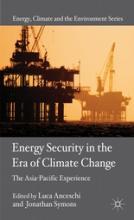Energy Security in the Era of Climate Change – The Asia-Pacific Experience
Joseph A. Camilleri, ‘Energy Governance in the Era of Climate Change', in Luca Anceschi and Jonathan Symons (eds), Energy Security in the Era of Climate Change – The Asia-Pacific Experience, London: Palgrave Macmillan, 2011, pp. 255-274.

The multilateral response to climate change is best characterised by reference to a number of thresholds, each of which was followed by a period of intense and often acrimonious negotiation. This chapter reviews these thresholds and the intervening phases because of the light they shed on the scope, modalities and trajectory of institutional innovation. Specifically, they are revealing of the tensions and incongruities that have emerged between different decision making arenas (notably states, markets and civil society), between different policy domains (notably energy, economy, security and environment) and between different tiers of governance (notably local, provincial, national, regional and global).
A common reaction to the apparent failings of the inclusive multilateralist design of the UN climate regime has been to propose increasing reliance on ‘minilateral’ approaches and innovations. This chapter takes issue with this approach. It argues that despite the roadblocks and disappointments, key actors have continued to engage in global negotiations, partly because the pressure to do so remains intense – pressure that emanates largely from civil society but also with increasing vigour from the marketplace. There is, however, another contributing influence, namely the exigencies of the present conjuncture. Though unilateral, bilateral and minilateral initiatives will remain an important feature of the policy response to climate change and energy security, these arrangements require an overarching framework which alone can give them guidance and potency.
